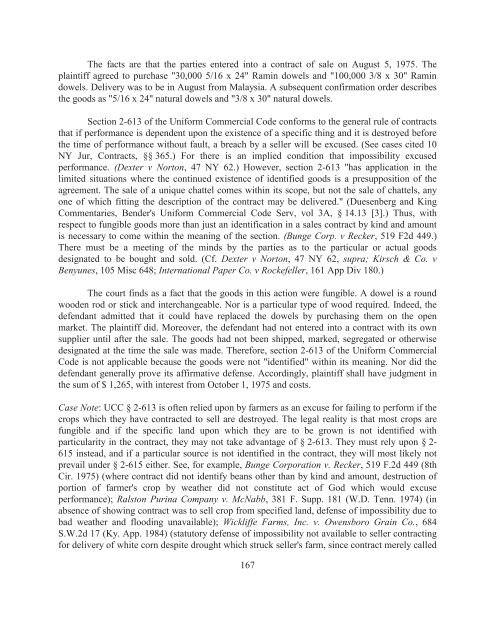Sales and Leases - A Problem-based Approach, 2016a
Sales and Leases - A Problem-based Approach, 2016a
Sales and Leases - A Problem-based Approach, 2016a
You also want an ePaper? Increase the reach of your titles
YUMPU automatically turns print PDFs into web optimized ePapers that Google loves.
The facts are that the parties entered into a contract of sale on August 5, 1975. The<br />
plaintiff agreed to purchase "30,000 5/16 x 24" Ramin dowels <strong>and</strong> "100,000 3/8 x 30" Ramin<br />
dowels. Delivery was to be in August from Malaysia. A subsequent confirmation order describes<br />
the goods as "5/16 x 24" natural dowels <strong>and</strong> "3/8 x 30" natural dowels.<br />
Section 2-613 of the Uniform Commercial Code conforms to the general rule of contracts<br />
that if performance is dependent upon the existence of a specific thing <strong>and</strong> it is destroyed before<br />
the time of performance without fault, a breach by a seller will be excused. (See cases cited 10<br />
NY Jur, Contracts, §§ 365.) For there is an implied condition that impossibility excused<br />
performance. (Dexter v Norton, 47 NY 62.) However, section 2-613 "has application in the<br />
limited situations where the continued existence of identified goods is a presupposition of the<br />
agreement. The sale of a unique chattel comes within its scope, but not the sale of chattels, any<br />
one of which fitting the description of the contract may be delivered." (Duesenberg <strong>and</strong> King<br />
Commentaries, Bender's Uniform Commercial Code Serv, vol 3A, § 14.13 [3].) Thus, with<br />
respect to fungible goods more than just an identification in a sales contract by kind <strong>and</strong> amount<br />
is necessary to come within the meaning of the section. (Bunge Corp. v Recker, 519 F2d 449.)<br />
There must be a meeting of the minds by the parties as to the particular or actual goods<br />
designated to be bought <strong>and</strong> sold. (Cf. Dexter v Norton, 47 NY 62, supra; Kirsch & Co. v<br />
Benyunes, 105 Misc 648; International Paper Co. v Rockefeller, 161 App Div 180.)<br />
The court finds as a fact that the goods in this action were fungible. A dowel is a round<br />
wooden rod or stick <strong>and</strong> interchangeable. Nor is a particular type of wood required. Indeed, the<br />
defendant admitted that it could have replaced the dowels by purchasing them on the open<br />
market. The plaintiff did. Moreover, the defendant had not entered into a contract with its own<br />
supplier until after the sale. The goods had not been shipped, marked, segregated or otherwise<br />
designated at the time the sale was made. Therefore, section 2-613 of the Uniform Commercial<br />
Code is not applicable because the goods were not "identified" within its meaning. Nor did the<br />
defendant generally prove its affirmative defense. Accordingly, plaintiff shall have judgment in<br />
the sum of $ 1,265, with interest from October 1, 1975 <strong>and</strong> costs.<br />
Case Note: UCC § 2-613 is often relied upon by farmers as an excuse for failing to perform if the<br />
crops which they have contracted to sell are destroyed. The legal reality is that most crops are<br />
fungible <strong>and</strong> if the specific l<strong>and</strong> upon which they are to be grown is not identified with<br />
particularity in the contract, they may not take advantage of § 2-613. They must rely upon § 2-<br />
615 instead, <strong>and</strong> if a particular source is not identified in the contract, they will most likely not<br />
prevail under § 2-615 either. See, for example, Bunge Corporation v. Recker, 519 F.2d 449 (8th<br />
Cir. 1975) (where contract did not identify beans other than by kind <strong>and</strong> amount, destruction of<br />
portion of farmer's crop by weather did not constitute act of God which would excuse<br />
performance); Ralston Purina Company v. McNabb, 381 F. Supp. 181 (W.D. Tenn. 1974) (in<br />
absence of showing contract was to sell crop from specified l<strong>and</strong>, defense of impossibility due to<br />
bad weather <strong>and</strong> flooding unavailable); Wickliffe Farms, Inc. v. Owensboro Grain Co., 684<br />
S.W.2d 17 (Ky. App. 1984) (statutory defense of impossibility not available to seller contracting<br />
for delivery of white corn despite drought which struck seller's farm, since contract merely called<br />
167


















